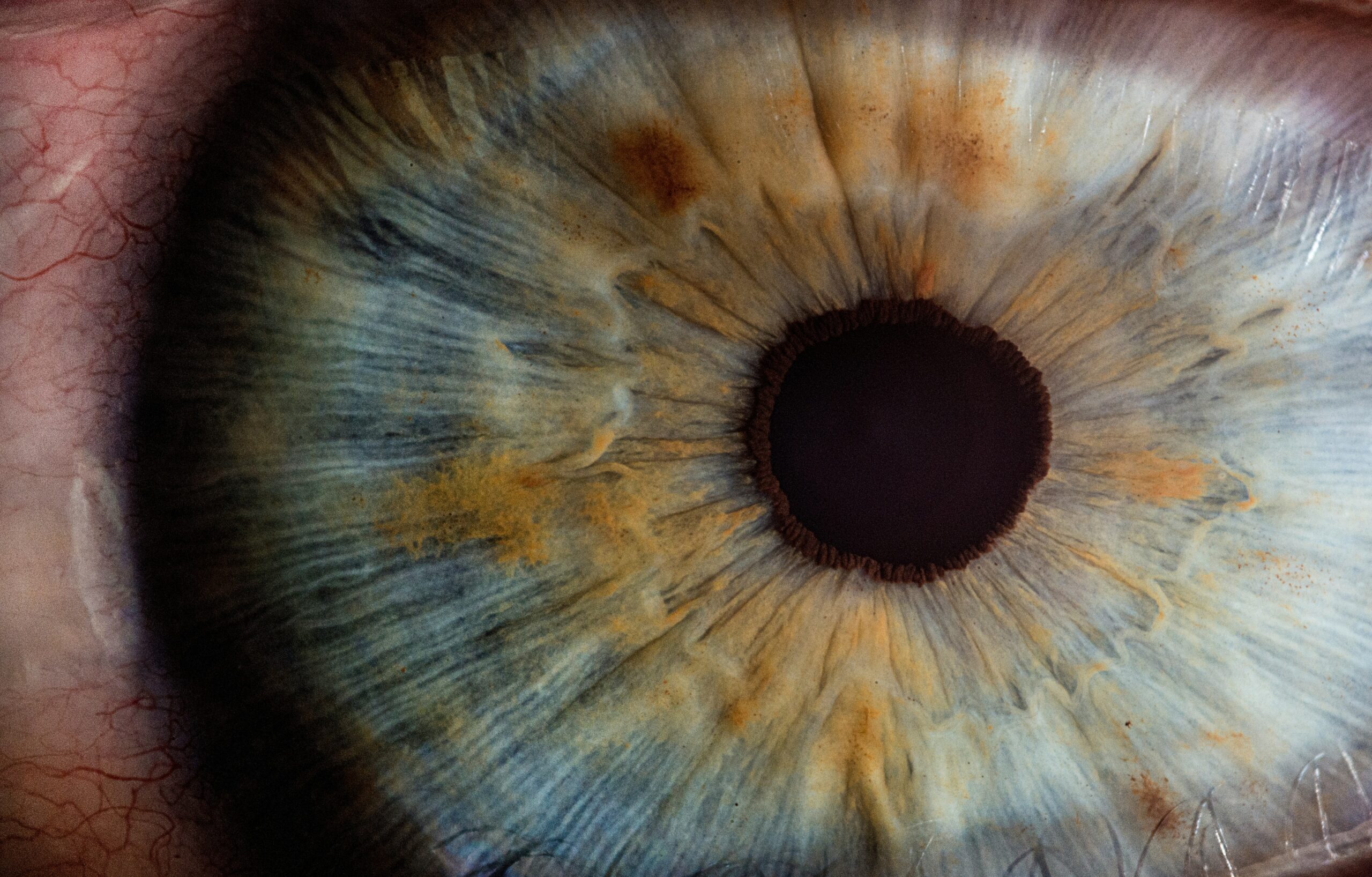The Bethmoers expected their neighbors.
Their apartment demanded guests. Meat cooked in the oven. All the lamps threw light.
The Muellers were expected at 8.
In private, the Bethmoers called Mrs. Mueller “the mouth.” Mrs. Mueller licked her lips often, consuming her lipstick through the night. Her lips, joked Mrs. Bethmoer, began the evening in a cocktail dress and ended it naked.
Mr. Bethmoer opened a shoebox containing two thin-wristed hands that once belonged to a professor.
Leaning into her vanity mirror, Mrs. Bethmoer pinched her eye between thumb and pinky. It squelched from the socket, followed by its mate. She tried on a blue pair, which made her face seem too round and too sweet, like a child’s. Then she tried a green pair, which should have complemented the dress but instead fell flat and dead as pebbles in her sockets.
“The hazels, I think,” Mr. Bethmoer said. He stood behind her, resting the professor’s hands on her shoulders.
She reached for the lacquered box. The vanity dimmed through the hazel eyes.
He was right, though. They went beautifully.
Music from the record player spilled into the kitchen. The meat roasted under the broiler; its crackling fat filled the silences between songs. The small Manhattan apartment filled with meat and rosemary, his professor hands and her dying hazel eyes, the clementine dress and the camelhair sportcoat.
There aren’t words for the Bethmoers. They live in the layer between meat and skin; they are the breath moving from body to body. They cannot remember their beginning, and they are unsure if they can die; they wear bodies of strangers the way I wear a dress.
Mr. and Mrs. Bethmoer met on Park Avenue two years earlier. She recognized what he was just before he recognized the same in her.
She took his arm. He wore a broad, comfortable face that felt namelessly familiar. She wore the trim body of a graduate student. They made, on accident, a beautiful and forgettable couple.
At the nearest bar, a red-leather-green-lampshade place, they interviewed each other over gimlets.
“Those are new legs,” she said.
He massaged his thigh. “I’m breaking them in.”
She perked up. “That’s how I knew, by your walking.”
He watched their reflection in the bar mirror.
“I’m sorry, was that rude? I’ve never met anyone else. I thought it was just me.”
“That must be so lonely.” He dug a thumbnail into the table’s polish. “I couldn’t imagine.”
Her hand caught his wrist. She pressed it. “Listen. Are there more? Do you know others?”
He opened his mouth as if to speak. When the words came, they trickled, slow. “I’ve met a few. My mother. One on a bus, down near New Mexico. There was a gathering, once. It ended badly.”
A hope doused in her chest. The steam of it rose to her throat. “Well. Perhaps they’re better at hiding.”
He kissed the heel of her palm. The intimacy robbed her of sadness. “I’m sorry,” he said.
She sat a minute. “Well.” She ordered another drink.
He didn’t say anything. They lingered until he paid the bill and whisked her into the street, down a block, into a hotel.
In their room, she caped herself in a cool white sheet and interrogated his body. “Look at all these stitches. You’re like a tapestry.”
“I like the way they fit together,” he said. “These calves belonged to a college boy, a rower. The leg bones came from an old man, but they’re in such good condition. Remarkable. I need to loosen the connection of the calf to the ligament – see? – that’s why I can’t walk quite right.”
“I don’t know how you do this. It’s like art.” She touched the scar that ran from his navel to throat. “I just…take them whole, usually. That’s what I like. If I put together more than three, I get all…I don’t know…jumbled. Like I’m renting four apartments in one building.”
“I can’t think about it anymore,” he said. “I’ll lose it.”
Her laugh cleared his head. She ran her palm down the seam of his chest. “How about this. If you could have anyone’s anything, what would it be?”
Sirens from the street caught his ear. He let them pass before answering. “Douglas Fairbanks’ face. I’d like to see if people recognized him. I tried, when he died. I drove to his monument, right in LA. This was just after the funeral. The whole thing had been torn up already. Someone else got there first.”
“I could see you as Fairbanks.” She ran her thumb along his face. “Mine isn’t famous. There was another girl at one of the orphanages. Stunning. And adopted, of course, one of the few. I wanted her legs.”
“Well, you could do that too,” he said. “Probably easier than I could find Douglas.”
She took his hand and lowered it under the cover, where his finger found the rubbery seam on her hip.
“Oh. You butchered it,” he said.
“I know. I was young.”
He palmed her scar, then parted the sheets to look closer.
“Hold on.” He leaned off the bed and grabbed his work bag. “Lie down and turn over, let me see it better.”
She extended her leg. He fished in the bag and pulled out a scalpel. “I can shave down the scarring. Hold this.” He handed her the empty water glass from the bedside table.
She sat up as he clipped a loupe to a pair of spectacles. “What if I like the scars?”
But he already dipped the scalpel into her leg, leaving a thin bloodless wake. “It looks like you did this with a chainsaw. Or your teeth?”
She didn’t laugh.
He adjusted the loupe on his glasses. He sliced a sliver of scar meat and dropped it into the glass she held. The skin spooled in the cup. The weight of it surprised her.
She watched the scalpel work. “What are you doing?”
“Please be quiet,” he said. “I can only focus on one thing.”
The music of the tools filled the room. She felt the tug of her skin and the prying of it from her body, but nothing hurt. Nothing ever hurt.
She closed her eyes and let him work.
He scraped with the scalpel, then pulled with a pair of needlenose pliers.
Slowly, the scar diminished. Its purple shadow looped around her thigh like a bridal garter.
He began the other leg. When he finished, he dropped the scalpel point-down into the cup of flesh. “I’m a mortician,” he said.
She ran her palm over the newly smooth skin.
“You’ll get used to it,” said the man. “Hand me the fish.”
“The fish?”
“The brown paper bag in my case.”
She dug into his work bag and, among a gun, a rusty old pen knife, rubber hosing, and glue, she found a leaking package tied in string. A drop of yellow liquid carried from her hand to his.
He unwrapped a sheaf of fish skins, pliable and translucent as onionskin. “I cure the fish myself. They’re like grafts.” He showed her the skin, draped over his fingers like a veil. The scales collected lamplight in divots and pockets, an ocean across his palm.
“Be still.” He plastered the skin on her leg and smoothed the wrinkles with a dry paintbrush. The fish’s skin blended with her own as smooth as a tattoo.
“I look like a mermaid,” she said.
“Don’t go swimming. Leave it for a few days.”
She lifted her leg. The lamplight ran off it like water.
By morning the fish skin began to dry. The next week it flaked off. Her legs had never looked so clean. Even the purple shadow of the old scars faded into a whispery brushstroke.
They married a year later, in his apartment where she met his mother and inherited her hazel eyes.
As a wedding gift, he found her a set of teeth so white they threw the honeymoon sun back at the sky. He joked that if she wanted his attention she should smile, like a lighthouse, and he’d catch the flash. She bared her teeth in the Hawaii sun, pretending to blind him.
She gave him a new penknife to replace the rusted one. He put it in his breast pocket and used it often. The trivial weight of the thing became a comfort; he carried to the deli, on the train, and now, here, in the Bethmoer living room, as he answered the door for the Muellers.
“We just got her down,” said Mrs. Mueller.
“Positively snoring,” said Mr. Mueller. “A thimble and she’s out. An easy date.” He hugged Mrs. Bethmoer and gave his neighbor a loose handshake. Gin lingered in his wake.
Mrs. Bethmoer took Mrs. Mueller’s coat. “How big is she?”
“Seven pounds,” said Mr. Mueller.
“Oh! Same as the roast.”
In the living room, Mrs. Bethmoer pressed glasses into everybody’s hands. Ice clinked and the Muellers, finding the Bethmoer apartment warmer than their own, held their cold drinks tight. Mr. Mueller pressed his glass to his temple.
Mrs. Bethmoer bubbled. She overpoured drinks which she made too strong. The magazines said to expect a hot summer. That Kennedy seems so arrogant. What is it like to have a baby?
Mr. Mueller scratched at a scar on the heel of his palm.
The record player skipped. Mrs. Mueller squeezed her husband’s knee and turned to Mrs. Bethmoer. “I’ve never noticed how pretty your eyes are,” she said.
Mrs. Bethmoer smiled. “Caroline, would you do me a favor?”
“Of course.”
The hostess took her guest’s hand. “I have a shade of lipstick, I have to see it on you. I look so flush in it.”
The men watched the bedroom door close.
“Let me get you another drink,” Mr. Bethmoer said. “You want another?”
“Yeah, sure.” Mr. Mueller’s pinky dug for the olive in his glass. The scar on his hand stretched through the prism of the cup. His shoulders hung loose.
As Mr. Bethmoer poured, Mr. Mueller’s voice filled the apartment. This, the surest sign he was drunk, he pulled the sheet off his rich bass. A voice like a Cadillac that only revs, Mr. Bethmoer thought. A battleship swimming laps in the harbor.
Mr. Mueller spoke in pleasant circles about the gargoyles in the city, then the beauty mark on the left breast of an old girlfriend.
Then Mueller said, “You know, I never understood drinking until I had a child.”
Mr. Bethmoer walked to the door, and Mr. Mueller raised his voice to be heard.
“I drink more now. A child changes you.”
Mr. Bethmoer locked the front door.
Mr. Mueller went on. “Makes you understand what civilization’s for. Not just the laws and police, but the, you know, the magazines. It’s the only thing keeping parents from bashing their babies against the fireplace. Without Broadway, there’d be infanticide all over. No. I’m kidding, sort of.” His eyes shot to the bedroom door, where their wives had disappeared. “It’s just that…have you ever seen something that helpless? And had it need you?”
Mr. Bethmoer had not.
Mr. Mueller’s spine straightened. “It’s disgusting.”
If Mr. Bethmoer had a voice like that, he’d sing. He uncapped his honeymoon penknife.
The door to the bedroom opened.
Mrs. Mueller stepped out of the bedroom. She smiled with lips that, for now, remained whole, full, painted.
Mr. Bethmoer capped his knife.
When they sent the Muellers home, full and drunk, Mrs. Bethmoer sat her husband on the couch.
“What happened?” he said. “I was looking forward to it.”
She held the professor’s hands, fidgeting with them while she spoke. He waited for her to tell him what happened, and then she did.
When she finished, Mr. Bethmoer looked up at the ceiling. “A baby?”
“Yes. One for us. We’re two, and we should have one.”
Mr. Bethmoer considered it. He smoothed his eyebrows with his thumb. The thought boiled inside him.
He wandered to the kitchen, and then to the window.
Outside, people tied to a single body walked or sang or struggled. Every day damaged them a little more. The sun roasted their faces. The cartilage of their knees scraped down to nothing.
His wife interrupted him. “And I don’t want the Mueller baby. It should be ours, we should make it like us.”
He returned to his wife and caressed her head.
She went on. “And I’ll have your mother to help, when she gets back from wherever she is. And it’s not like having a baby changes who you are. It adds to you, it doesn’t take away.”
He thought it over. He cleaned the kitchen.
She grew impatient.
They made a baby.
It came quick and natural, easier than sex, easier than breathing. They began with the cork from the wine that the Muellers brought. They soaked it in the roast’s fatty drippings, and then they wrapped it in an unlucky cat’s intestines. They secured the whole mess with twine.
Mrs. Bethmoer hauled out her sewing machine.
Mr. Bethmoer raided the morgue.
They worked on instinct and opportunity. When a suicide came across his table with a fetus in her womb, he brought it home in deli paper and rearranged its capillaries with a contraption made for tying fly-fishing lures. Mr. Bethmoer scrounged a pudgy pair of legs from the morgue; Mrs. Bethmoer wrapped them in fish skin.
Mrs. Bethmoer wallpapered the den in yellow, then tore off that wallpaper and tried a floral print, but hated it so much that she ruined a seamstress’s hands clawing it off the walls.
When he returned from work, Mr. Bethmoer laughed at the shredded room. “Your temper!”
She tore away a flap of wallpaper. “It just isn’t right,” she said. “It should be easy.”
He wrapped a pair of arms around her. “It will be. You’ll get it.”
“I want it to be perfect.”
The baby accumulated in the living room. They set it under a heat lamp meant for reptiles. Soon it had a pair of Kelly-green eyes, swiped from a child Mrs. Bethmoer found alone in the library, stuttering through a picture book.
“You’re being reckless,” Mr. Bethmoer said when she pulled them from her purse. They floated in a highball glass, their stems trailing like the silky fins of beta fish. Still, they were beautiful. Glassy little marbles that slid into the baby’s waiting skull and shook as if dreaming. They stilled only when Mr. or Mrs. Bethmoer appeared. Then the eyes followed the parents around the room.
“I don’t like that,” Mr. Bethmoer said. “I don’t know what it’s doing.”
“It’s just curious.”
They peered at it.
Soon, the Bethmoer baby could bend its baby Bethmoer fingers and fill its stolen, mismatched lungs. It made a noise that verged on a cry.
Mrs. Bethmoer lifted it from the crib and, seeing his wife and child, Mr. Bethmoer felt something he had never felt before. He would later learn to call it regret.
They took it from the living room and moved it into a nursery mutilated by its mother.
The baby squirmed. Mrs. Bethmoer lifted it to her shoulder. “Welcome to your room, baby!” She kissed the child’s head and then her husband’s mouth, the baby’s rump between them. The kiss felt thin, lipless.
Between them, the baby stirred. It pealed in fits. The voice sounded more animal than infant. Its watery whine thickened into a moan.
It occurred, independently to each parent, that this could have gone horribly wrong. The thing between them looked like a baby; it had a baby’s face and organs and viscera. But other animals have their internal biology as a foreman. The invisible blueprints guiding other parents did not guide the Bethmoers.
The Bethmoer baby said, “I don’t like this.”
The mother nearly dropped her child. The father’s mouth hung dumb.
The baby pushed away from its mother’s breast. “—I do not like this. I don’t like this, I do not like this –“
Mrs. Bethmoer transferred the baby to the other arm. “Is this right?”
“—I do not like this I do not like –”
“I don’t know,” Mr. Bethmoer said. “Baby, be quiet. Quiet down now.”
The baby stared at its father. “—don’t like this do not like this do not like –“
The baby kicked in its mother’s arms, eyes rolling like a horse’s. Its arms thrashed. Its voice whipped and cracked and repeated, “I do not like this, do not like –“
Mrs. Bethmoer petted its head, but the thing spoke louder and clearer, and then it reached up, into its mother’s mouth, and pulled. Honeymoon teeth scattered on the carpet.
Mrs. Bethmoer dropped the baby and clutched her mouth. The child hit the carpet and shrieked before Mrs. Bethmoer realized what she did. “I’m thorry, baby,” she said.
She knelt to the carpet and swaddled the child tight, but it fought against the cloth. “God, it’th thtrong,” Mrs. Bethmoer said. Her voice whistled through broken teeth. She tucked the infant between her knees to keep it still, but it shrieked and pushed aside her knee.
She wrapped it again. The child whipped its head against her legs. “I hate you, I hate you,” it said.
Mr. Bethmoer dug in his pocket. “Its mouth, shut its mouth,” he said. He freed a needle and thread from his trousers while his wife clamped the baby’s jaw.
Mr. Bethmoer bent down. Practiced fingers sewed the mouth shut, but it screamed through the stitches.
She put her hand over its mouth to muffle the scream. “The radio, c’mon!” The apartment walls, so thin, could not contain the baby’s crying. The Muellers would investigate. They would find the Bethmoer child, a perversion of their own. The police would come, they would enter the closets, their lovely deep closets.
Mr. Bethmoer nearly broke off the volume knob turning up the music. A string quartet overpowered the infant whine. Those Kelly-green eyes stopped shaking. The baby began to hum tunelessly.
The parents retreated to the doorway. It watched them.
Mrs. Bethmoer touched her teeth. “What did we do?”
Mr. Bethmoer dragged his thumb across his eyebrows. “This is your fault. I never wanted it.”
She would have killed her husband, if she knew how.
“You made it, too.”
“I don’t want it here, in the apartment,” he said. “It’s not right.”
They looked at it. The child could not move its head in tandem with its eyes. There was a delay between the two. The eyes went left, and then the head followed.
Mr. Bethmoer gathered his coat. “I’m going.”
“Where?”
But he fled the room. The apartment door opened and closed. Mrs. Bethmoer stood alone with her baby. She collected her teeth and replaced them.
The baby watched. It hummed and jerked its torso.
She stood over it. She could have stomped it into paste. Its humming lowered into a soft purr.
She lowered the ball of her foot onto the baby’s chest. Its lungs filled and emptied. She let them. She’d made them.
Mrs. Bethmoer crouched and touched the stitches in her child’s mouth. “You have to be quiet,” she said to it. “Shhhhhh.”
She pulled the string. It unspiraled from the lips. Loosened, the fragile mouth twitched, then split into a wide, idiot smile.
Mrs. Bethmoer put her hand over her own mouth.
This thing didn’t know how to smile. It didn’t know what a smile meant, or why it should, or how, but it smiled.
She picked the child up. She freed its arms from the swaddle, and the baby stroked its mother’s shoulder with both hands.
“More,” it said.
She heard the quartet from the radio. It was noise just a second ago, and now it became music.
Mrs. Bethmoer bounced the child against her chest. It giggled. It leaned back and rocked its head so hard that she nearly dropped it.
“Don’t do that,” she said. “You have to be careful.”
It kept pushed against her again, hard, the weight of its head stretching the seams on its throat. Mrs. Bethmoer caught the baby’s head in her palm. “Stop, stop that,” she said.
It threw its head back again, as if trying to dislodge it.
She brought it to her bed.
The baby flopped on the duvet. It left a drool-damp trail.
Mrs. Bethmoer got on the bed. She stretched out her legs and pulled a pillow under her head.
In the middle of the night, Mr. Bethmoer slinked back into the apartment. He wore a lecherous body, something he’d found staggering across a subway station.
He stood in the doorway of their bedroom. Mrs. Bethmoer could only see the light slurrying in the grease of his hair.
His wife and child filled the bed. Mrs. Bethmoer held a finger to her lips.
He ignored it. “Is it sleeping?”
She nodded.
He leaned against the doorframe. “Is this what you wanted?”
She made sure the child didn’t wake up, then whispered, “No, I didn’t want this. I wanted something different from this.”
The baby snorted in its sleep. It laughed.
“Disgusting,” Mr. Bethmoer said.
She stroked the child’s belly. “But it doesn’t mean that I don’t want this now.”
Mr. Bethmoer reached into the strange man’s coat.
“I brought you something,” he said. He pulled a wet rag from the inside of his jacket. He held it out to her.
In his palm pouted Mrs. Mueller’s lips, plump on the tatters of her face.
“I’ll trade you,” Mr. Bethmoer said. “We’ll go back to how it was, before it.” He held out the lips.
“I don’t want that anymore,” she said, looking at the scraps of Mrs. Mueller. “It’s about the baby now.”
“Well it’s not sleeping in my bed.”
A brief, hushed struggle, and then Mr. Bethmoer had the baby by the arm. He carried it to the cradle. When it threatened to scream, he broke out the needle and thread and sewed the baby’s lips. He dropped the needle, scissors, and child onto the pillow.
Things would be better, he said, in the morning.
Mrs. Bethmoer flushed the neighbor’s lips.
Mr. Bethmoer woke before his wife and found the child sitting in the shreds of its own legs. The sewing scissors slashed at the bloodless scraps, the baby singing, to itself, “These I hate these I hate them I hate these.”
He rolled up his sleeves and torqued the baby’s femurs from its hips.
The baby sighed. The scissors fell to the side.
Mr. Bethmoer held a leg like a tattered turkey drumstick. When was the last time he ate? He shoved it under the baby’s pillow.
A week ago, this thing didn’t exist. Mr. and Mrs. Bethmoer could entertain and be entertained. What now? A pile of loose viscera owned them.
Mr. Bethmoer lifted his child from the cradle. He took it to the kitchen and, in six quick pumps, stapled shut its mouth, then its eyes. Quick needlework, sloppy but firm, reattached the legs.
Before Mr. Bethmoer met Mrs. Bethmoer, he could stay out for hours. He could slide out of one body and into another. Once, he snatched a timid straggler in the orbit of a stag party. Mr. Bethmoer snuck into his skin and drank with men that, for an evening, became his friends. They called him Pete.
He could do that again. He picked up the child, sheet and legs and all.
Mrs. Bethmoer slept in the bedroom.
He took the child into the city.
Mr. Bethmoer staggered through a crowd. The child tried to scream through its stapled mouth, but the muffled whine sounded more like a pencil sharpener.
Was everybody watching him, or was he watching everybody? Don’t stoop, he told himself. Walk tall. Fix your hat. He wasn’t wearing a hat. Should he steal one? Buy one?
The child squirmed in his arms. He wrapped it tighter.
He found himself near the Staten ferry. He bought a ticket from a man with Douglas Fairbank’s face. They blinked at each other – no, no time. Mr. Bethmoer boarded the ferry. He stood near the railing, alone, while a gray drizzle whipped his face.
The child’s mouth worked over like a teen chewing gum. The staples loosened. One fell out.
“Stop that,” said Mr. Bethmoer. “No talking now.”
“Okay,” the child mumbled.
The ferry lurched from port.
The father held the thing on his forearm. Below them, the hull bore the abuse of jagged whitecaps.
Were other passengers watching him from the hold? Could they see the staples falling loose from the baby’s lips?
The Hudson roiled under the balcony. The water sloshed in eddies and sharp waves.
Mr. Bethmoer rolled the child off his arm. It fell in silence and barely made a splash.
At Staten, Mr. Bethmoer bought a return ticket and a cup of coffee. The seagulls screeched as if for the first time. He heard them. He listened to each call.
The sun dried the clouds by the time he returned to Manhattan.
When he returned to his apartment, he found his wife sitting with a prim young woman, a schoolmarm of a girl with a tight, cold smile. “Mother,” he said. “I didn’t…when did you get here? Where have you been?”
His mother looked only at his chest, and then his empty hands. “Do you have the little one?”
“No. I threw it into the harbor,” Mr. Bethmoer said. “We thought we could manage. We couldn’t.”
He stared at his wife.
Mrs. Bethmoer searched her husband’s face – a stranger’s face, yes, but his. In the strange folds of that mask, she found him, the thing that he was, the creature that animated the bodies, the arms, the faces that they collected. She found him in there, guilty, begging her through those piggish, unfamiliar eyes. “I’m sorry,” he said.
Mrs. Bethmoer put a hand on her stomach. She expected – what? – anger? This felt like less than that. Their apartment grew larger, and as it grew it felt quiet and empty.
Mr. Bethmoer’s mother clucked her tongue. “I see from your teeth, it got into your mouth, dear? Oh, what a rascal. You should have seen this one as a child. A terror.”
“Yes,” Mr. Bethmoer said, “but you kept me. You didn’t abandon me.”
“Not for lack of trying. Oh, yes. I remember that feeling. I left you on highways, once in the Catskills – I still don’t know how you found your way back. I expected the wolves to get you, you know. Though you did come back a little, I suppose, chewed.”
Mr. Bethmoer, as if from a dream, remembered a moon and a snowbank and ripping teeth.
Mrs. Bethmoer knelt in front of her mother-in-law. “You did?”
“Oh, yes, honey. Babies are little monsters, you know. Everyone needs a break.”
Mrs. Bethmoer looked out the window.
The new grandmother rolled her eyes. “The little one will come back, I’m sure of it. In the meantime, you should clean this apartment. And maybe, perhaps, be prepared for a very soggy infant. Now, you two sit there. I brought gifts from the Congo.”
It happened two weeks later. As Mr. Bethmoer walked home from a long night at work, he found a soggy pile of wet rags and flesh pulling itself towards their apartment building.
He squatted in front of the thing. Beneath folds of briny skin, a flash of smiling Kelly green.
Up in the apartment, Mrs. Bethmoer swept the child into the air. “You found us again, you clever beast!” She kissed its waterlogged neck and chest. “Honey, bring me the staple removers!”
Mr. Bethmoer loosened the lingering staples from the corners of the baby’s mouth. The baby spit up green water on the floor and then laughed.
“Little Hudson,” Mrs. Bethmoer said. “That’s what we’ll name it. Like the harbor.”
Mr. Bethmoer kissed the top of his wife’s head, and then he kissed the top of Hudson’s head. “You’re so good with names,” he said, and then, “I think Hudson needs a bath.”
“That’s not all,” she said. “It has a new name, and it needs a new home. The city is too much, it’s too loud. I hate the city. And Hudson hates the city, don’t you baby?”
“I hate the city,” said Hudson, though what it really hated was the harbor.
Mrs. Bethmoer hugged her child and spun. Her skirt lifted with the twirl. “We’re going to move. Somewhere in the country, Connecticut, somewhere better for baby,” she said.
“Better for baby,” Hudson mimicked.
Mr. Bethmoer nodded. “Yes,” he said. “A change could be nice.”




